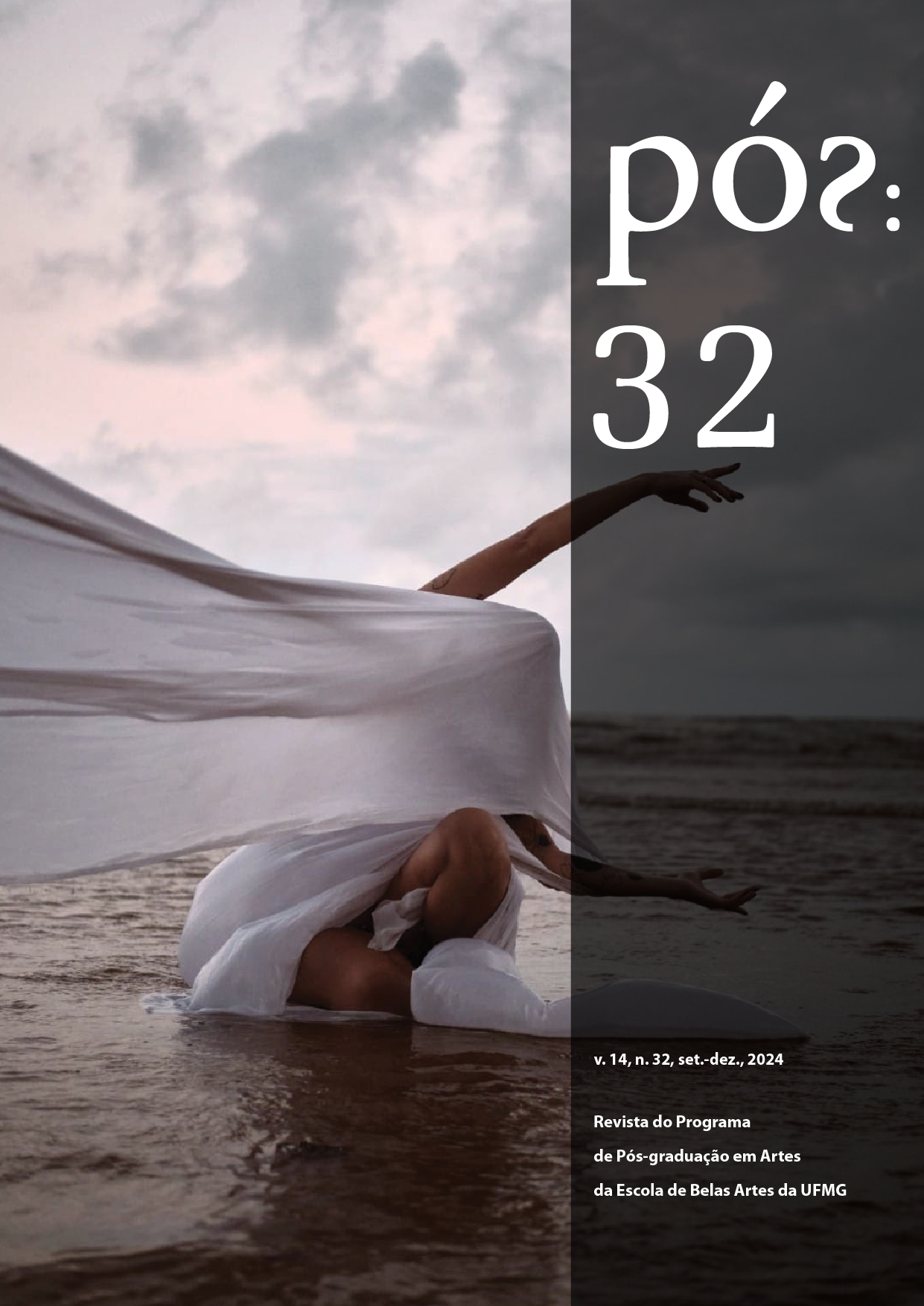Peles e panos da cena
Performance Sulcos e a materialidade do grau zero do figurino
DOI:
https://doi.org/10.35699/2238-2046.2024.52671Palavras-chave:
Performance Sulcos, Grau zero do figurino, Rostidade, Máscara ExpandidaResumo
Ao problematizar estudos da produção de figurino para performance e pensar as matérias de sua criação, o presente artigo discute a criação do figurino como materialidade do corpo em performance, ou ainda, mais especificamente, a partir das matérias em fluxo que passam pelo corpo em performance. Para isso, o grau zero do figurino se desenha a partir da perspectiva semiológica de Roland Barthes e se desdobra, por meio do pensamento de Gilles Deleuze e Félix Guattari, através do conceito de rostidade. Portanto, este estudo compreende o grau zero do figurino como uma dimensão ético-estética acerca dos movimentos e panos do corpo em performance, tal como uma máscara expandida,
compondo efeitos de superfície que se efetuam no corpo, demonstrados na série de performances nomeada Sulcos.
Downloads
Referências
AGAMBEN, Giorgio. Nudez. Tradução de Davi Pessoa Carneiro. Belo Horizonte: Autêntica, 2014.
ARTAUD, Antonin. O teatro e seu duplo. São Paulo: Martins Fontes, 2006.
AUSLANDER, Philip. A performatividade da documentação de performance. Performatus, Inhumas,
ano 2, n. 7, nov. 2013.
BARTHES, Roland. O grau zero da escritura. Tradução de Maria Margarida Barahona. Lisboa: Edições
, 1973.
BARTHES, Roland. O neutro: anotações de aulas e seminários ministrados no Collège de France,
-1978. Tradução de Ivone Castilho Benedetti. São Paulo: Martins Fontes, 2003.
BARTHES, Roland. A morte do autor. In: BARTHES, Roland. O rumor da língua. Tradução de Mário
Laranjeira. São Paulo: Martins Fontes, 2004.
BARTHES, Roland. Crítica e verdade. Tradução de Leyla Perrone-Moisés. 3. ed. São Paulo: Perspectiva,
CARLSON, Marvin. Performance: uma introdução crítica. Tradução de Thaís Flores Nogueira Diniz e
Maria Antonieta Pereira. Belo Horizonte: Editora UFMG, 2010.
CORTINHAS, Rosângela. Figurino: um objeto sensível na produção do personagem. 2010. 81 f.
Dissertação (Mestrado em Artes Cênicas) – Universidade Federal do Rio Grande do Sul, Porto Alegre,
DELEUZE, Gilles. Lógica da sensação. Tradução de Roberto Machado e colegas. Rio de Janeiro: Zahar,
DELEUZE, Gilles. A dobra: Leibniz e o Barroco. Tradução de Luiz B. L. Orlandi. 6. ed. Campinas: Papirus,
DELEUZE, Gilles; GUATTARI, Félix. Mil Platôs: capitalismo e esquizofrenia. Vol. 1. Tradução de Aurélio
Guerra Neto e Celia Pinto Costa. São Paulo: Editora 34, 1995.
DELEUZE, Gilles; GUATTARI, Félix. Mil Platôs: capitalismo e esquizofrenia. Vol. 3. Tradução de Aurélio
Guerra Neto, Ana Lúcia Oliveira, Lúcia Cláudia Leão e Suely Rolnik. São Paulo: Editora 34, 1996.
DELEUZE, Gilles; GUATTARI, Félix. Mil Platôs: capitalismo e esquizofrenia 2. Vol. 4. São Paulo: Editora
, 2012.
DIDI-HUBERMAN, Georges. O ser crânio: lugar, contato, pensamento, escultura. Belo Horizonte:
C/Arte, 2009.
DINIZ, Carolina de Paula. Vestíveis em fluxo: investigação das materialidades na produção do
corpo/artista contemporâneo. Revista Brasileira de Estudos da Presença, Porto Alegre, v. 7. n. 2, p.
-406, 2017. Disponível em: https://www.scielo.br/j/rbep/a/Bd8txckCsHpZxTxqShwgYbB/. Acesso
em: 11 abr. 2024.
FERNANDEZ, Dominique. O ouro dos trópicos: passeios pelo Portugal e o Brasil Barrocos. Tradução
de Paulo Neves. Porto Alegre: Sulina, 1996.
GLUSBERG, Jorge. Arte da performance. Tradução de Renato Cohen. 2. ed. São Paulo: Perspectiva,
GOLDBERG. Rose Lee. A arte da performance: do futurismo ao presente. Tradução de Percival
Panzoldo de Carvalho. São Paulo: Martins Fontes, 2006.
HOFFMANN, Ana Cleia Christovam. Pinturas de si: moda e artesania da existência. 2015. 157 f.
Dissertação (Mestrado em Educação) – Universidade Federal do Rio Grande do Sul, Porto Alegre,
LEVY, Tatiana Salem. A experiência do fora: Blanchot, Foucault e Deleuze. Rio de Janeiro: Civilização
Brasileira, 2011.
MARTINS, Leda Maria. Performances do tempo espiralar: poéticas do corpo-tela. Rio de Janeiro:
Cobogó, 2021.
NIETZSCHE, Friedrich. O nascimento da tragedia, ou Grécia e pessimismo. 2. ed. Tradução de
Antônio Carlos Braga. São Paulo: Escala, 2011a.
NIETZSCHE, Friedrich. Escritos sobre educação. Tradução de Noéli Correia de Melo Sobrinho. 5. ed.
São Paulo: Loyola, 2011b.
PELED, Yiftah. DTEEP: dinâmicas e trocas entre estados de performance. 2013. 210 f. Tese (Doutorado
em Poéticas Visuais) – Universidade de São Paulo, São Paulo, 2013.
RAMOS, Adriana Vaz. O design de aparência de atores e a comunicação em cena. 2008. 187 f. Tese
(Doutorado em Comunicação e Semiótica) – Pontifícia Universidade Católica de São Paulo, São Paulo,
ROMAGNOLO, Sérgio. A dobra e o vazio: questões sobre o Barroco e a arte contemporânea. São
Paulo: Editora Unesp, 2018.
SCHECHNER, Richard. O que é performance? O Percevejo, ano 11, n. 12, p. 22-50, 2003.
ZORDAN, Paola. Gaia educação: arte e filosofia da diferença. Curitiba: Appris, 2019.
Downloads
Publicado
Edição
Seção
Licença
Copyright (c) 2024 Ana Hoffmann

Este trabalho está licenciado sob uma licença Creative Commons Attribution-NonCommercial 4.0 International License.
Autores que publicam nesta revista concordam com os seguintes termos:
- Autores mantém os direitos autorais e concedem à revista o direito de primeira publicação, com o trabalho simultaneamente licenciado sob a Creative Commons Attribution-NonCommercial 4.0 International License que permite o compartilhamento do trabalho com reconhecimento da autoria e publicação inicial nesta revista.
- Autores têm autorização para assumir contratos adicionais separadamente, para distribuição não-exclusiva da versão do trabalho publicada nesta revista (ex.: publicar em repositório institucional ou como capítulo de livro), com reconhecimento de autoria e publicação inicial nesta revista.
- Autores têm permissão e são estimulados a publicar e distribuir seu trabalho online (ex.: em repositórios institucionais ou na sua página pessoal) a qualquer ponto antes ou durante o processo editorial, já que isso pode gerar alterações produtivas, bem como aumentar o impacto e a citação do trabalho publicado
- É responsabilidade dos autores a obtenção da permissão por escrito para usar em seus artigos materiais protegidos por lei de Direitos Autorais. A Revista PÓS não é responsável por quebras de direitos autorais feitas por seus colaboradores.












